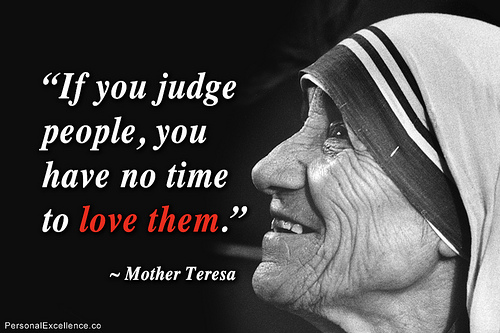We run our website the way we wished the whole internet worked: we provide high quality original content with no ads. We are funded solely by your direct support. Please consider supporting this project.
How Judging Blocks Love
What keeps us from fulfilling the law of love that is exemplified by Jesus and laid out in the Scriptures (Matt. 22:39-40; Rom 13:8,10 Gal 5:14)? In a word, we like to pass verdicts. To some extent, we get our sense of worth from attaching worth or detracting worth from others, based on what we see. We position ourselves as judges of others rather than simply as lovers of others. Our judgments are so instinctive to us that we usually do not notice them. Even worse, they are so natural to us that when we do notice them, we often assume we are righteous for passing judgment! Because of this, it is easy to overlook the fact that our judgments are blocking our love, keeping us asleep, preventing us from living in the truth God created us to live in.
Another way of saying this is that we fail to abide in love because we choose to live from our knowledge of good and evil. This is why the Bible depicts the origin of our separation from God as eating form the Tree of Knowledge of Good and Evil, which was in the middle of the garden (Gen 3:1-9).
Consider, why was the fruit of the forbidden tree a fruit that was said to give the knowledge of good as well as evil? Isn’t the “knowledge of good” a good thing? Aren’t we Christians supposed to be promoting “the knowledge of good”? Isn’t following God all about increasing our “knowledge of good and evil” so we can side with “the good” and resist “the evil”? And yet, whether it fits our preconceptions or not, in the Genesis narrative the nature of the sin that separates us from God is said to be the “knowledge of good and evil.”
What is it about eating fruit from the Tree of Knowledge of Good and Evil that warrants its depiction in Scripture as the source of original sin? How does living from our knowledge of good and evil separate us from God? These questions are rarely asked and even more rarely investigated with any thoroughness. It is largely for this reason that the church has failed so miserably at loving the way Christ commands us to love.
We have failed to understand and internalize the biblical teaching that our fundamental sin is not our evil—as though the solution for sin was to become good—but our getting life from what we believe is our knowledge of good and evil. Our fundamental sin is that we place ourselves in the position of God and divide the world between what we judge to be good and what we judge to be evil. And this judgment is the primary thing that keeps us from doing the central thing God created us to do, namely, love like he loves.
Because we do not usually understand and internalize the nature of our foundational sin, we usually think our job as Christians is to embrace a moral system, live by it, and thus to be good people in contrast to all those who are evil. In fact, God’s goal for us is much more profound and much more beautiful than merely being good: it is to do the will of God by being loving, just as God is loving. God’s goal for us is to discover a relationship with him and thereby a relationship with ourselves and others that returns us to a state where we don’t live by our knowledge of good and evil.
Walking in obedience to God, we are still to detect good and evil, of course. Living in love in no way implies moral relativism. But we are not to derive any worth from our detection of good and evil. Nor are we to draw conclusions about people on the basis of it. We are to derive worth from God alone and to love without judgment and without conditions on the basis of the unsurpassable fullness we get from God. Out job is to love, not judge.
—Adapted from Repenting of Religion, pages 16-18
Category: General
Tags: Judgment, Kingdom Living, Love, Tree of the Knowledge of Good and Evil
Topics: Following Jesus
Related Reading

Jesus and Democracy
Question: I’ve heard that the reason Jesus didn’t speak up on political issues was because he didn’t have the benefit of living in a democracy. Since we do, don’t we have a duty both to God and our country to be involved in politics? Answer: If the reason Jesus didn’t speak up on political issues…

The Kind of Sin Jesus Publicly Exposes
Image by danny.hammontree via Flickr Religious sin is the only sin Jesus publicly confronted. The religious variety of the forbidden fruit is the most addictive and deceptive variety. Instead of acknowledging that judging others is prohibited, religious idolatry embraces the knowledge of good and evil as divinely sanctioned and mandated. It gives the illusion of being on…

When Technology Becomes an Idol
Our dear friend Bruxy Cavey wrote this reflection on how technology can contribute to spiritual apathy. Has technology replaced God in ways you may not have noticed? It’s good to “unplug” on a regular basis to reconnect to the real source of our LIFE. From the article: The Internet robs us of our sense of our…

No Room for Judgment
In the light of the horrible violence in Orlando, and in response to the sickening judgmental statements that some Christian leaders have been making since the mass shooting about the victims who belong to the LGBTQ community, this is a time to remember our calling to revolt against all judgment as kingdom people. In the…

How God Changes the World
All who place their trust in Jesus look forward to a day when he will return and fully establish the kingdom of God. When this happens, Scripture promises that everything will change. There will be no more sickness, death, hunger, natural disasters, violence, fear, heartaches, sin, or evil. There will be no more racism, nationalism,…

Q&A: Condemning Sin
Q: I have a question about how you answer the rare occasions when Jesus apparently felt it necessary to publicly condemn sin: like the cleansing of the temple and his very strong judgments on Pharisees and rulers in Matthew 23. Also John the Baptist who not only preached strongly regarding public sins but was imprisoned…

